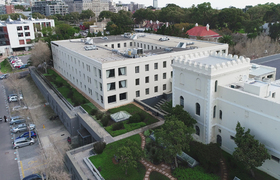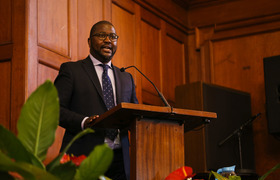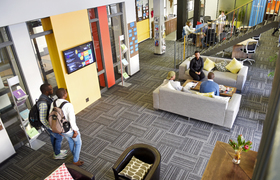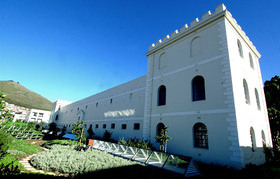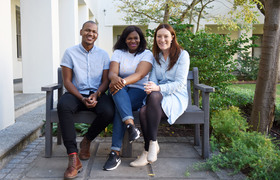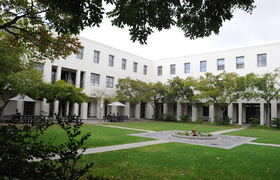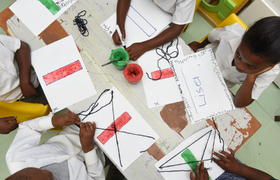Institutional autonomy under threat
25 July 2017 | Story Supplied. Photo Robyn Walker.
Speaking at the UCT Graduate School of Business (GSB) last week, Dr Jonathan Jansen, former vice-chancellor and rector of Free State University, cautioned that you can’t make up for the deficit of black professors in academia at the “output” end, and a much more holistic approach is needed to tackle the issue.
Jansen also called for fully funded education for all poor students. He was responding to questions from the audience at an event hosted by GSB director, Associate Professor Mills Soko, to discuss Jansen’s new book, As by Fire: The End of the South African University.
South Africa's universities view their autonomy as sacrosanct and have in recent years raised concerns about new laws allowing government to directly interfere in their affairs. Institutional autonomy, said Jansen, was under threat from various regulations in what can be seen as a clear attempt to prevent universities from making decisions on certain things.
Earlier this year, President Jacob Zuma signed the Higher Education Amendment Act, which gives Higher Education and Training Minister Blade Nzimande the power to determine transformation objectives and puts mechanisms in place to ensure that the objectives are met. It also empowers the minister to withhold funding under specific circumstances.
Nzimande recently set up a 10-member committee to fast-track transformation in the tertiary sector, including setting clear targets and indicators. A separate task team is also to be appointed to investigate the shortage of black academics in the higher education sector. The task team will probe the obstacles in the production of black South African academics, and will be chaired by the former deputy vice-chancellor of the University of South Africa (Unisa), Professor David Mosoma.
Not an overnight solution
Jansen said it was clear that the government and the minister were frustrated with the slow pace of transformation in the sector.
“But what you cannot do is to tell a university who to appoint, at what levels to appoint, who to admit and when and why. What to teach and not teach … However, I am the first to say that universities must be held accountable for state funding,” he said.
Addressing the shortage of black professors was not an overnight thing, he emphasised.
“I literally travelled around the world looking for South African academics to come back home from the diaspora to get more black professors to universities and so on. I have spent many years myself training many young black senior lecturers … it takes a long time to become a professor and very few people choose that career. So to look for some major mysteries inside universities and [to say the institutions] are blocking people from becoming professors cannot be right.”
However, what was true, Jansen said, was that there were a lot of universities “making people professors – many of whom should never have been professors”.
“And there is a precedent for this. The precedent is in the Afrikaans universities … because if you had the ‘right genitals’ and were loyal to the broederbond you became a professor … I would never have appointed some of them as professors … We cannot let [nationalistic views] determine who becomes a professor. You become a professor because you are an outstanding scholar … you cannot just appoint to make up the numbers.”
Reflecting on the funding crisis
In his book, Jansen interviews some of SA’s vice-chancellors to get their perspective on the protests on campuses around the country, which first erupted in 2015. SA’s universities were rocked by demonstrations as students demanded that fee increases be scrapped. The government agreed to no fee hikes in 2016 and capped increases for the 2017 academic year at 8%. Students ultimately want free education.
Jansen said the purpose of his book was to “reflect on [that] historic moment in the country”.
“We haven't seen such intense protest. That 2015 moment was very important and admirable and raised the specific issue of the funding crisis [at universities],” he said.
While it was unrealistic to expect government to provide free education for all, it was possible within the fiscal framework to provide fully funded education to all poor students.
“You don’t fund the rich unless you want to increase inequality,” said Jansen, who added that the fees commission set up to look into the feasibility of free higher education was a “waste of time”. It was set up to buy government time, he said.
“What you need is a political decision. We are not going to see anything we do not know coming from the fees commission report.”
Many observers, including Jansen, believe that government will not agree to student demands to provide free higher education for all. The government, which is struggling with a budget deficit of just over 3% of GDP, has previously stated that education subsidies should not come at the expense of other key sectors, such as basic education, early childhood development, health and housing.
 This work is licensed under a Creative Commons Attribution-NoDerivatives 4.0 International License.
This work is licensed under a Creative Commons Attribution-NoDerivatives 4.0 International License.
Please view the republishing articles page for more information.







